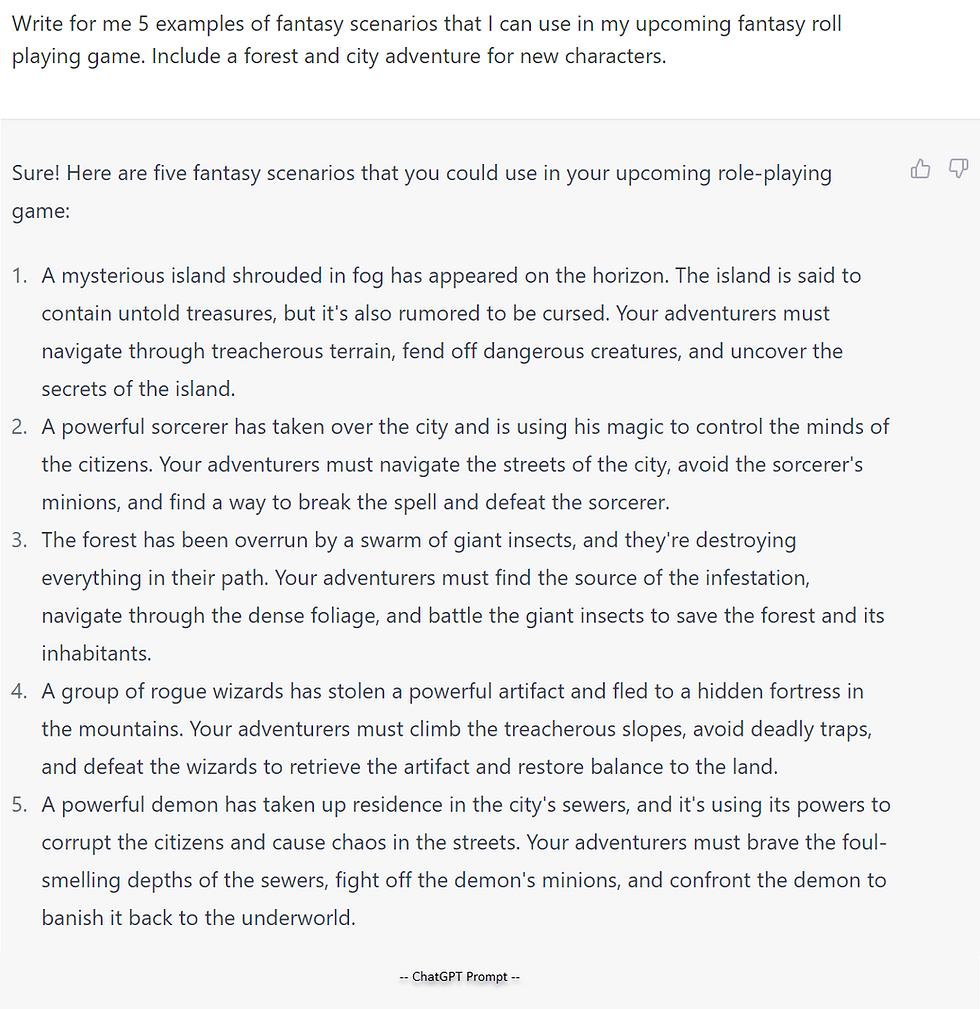The Future of Fantasy RPGs: Exploring the Potential of Generative AI in Game Content Creation
- Danny McKeever
- Feb 16, 2023
- 3 min read
Updated: Feb 27, 2023

Fantasy Role Playing Games (RPGs) have been captivating players for decades. Players love to explore new worlds, create unique characters, and embark on epic quests. However, the process of creating compelling game content can be time-consuming and challenging for game developers. This is where Generative AI comes in, providing a promising solution to revolutionize RPG content creation in the future.
Try this in ChatGPT:
**Write for me 3 NPC Dungeons and Dragons character backgrounds. For each of them, give me their name, where they are from, what class they are, and a current motivation. Tell me what they are wearing. Then write for me either a positive or negative quirk, what their voice sounds like, and a common term or word that they often say that makes them unique.**
Generative AI is an innovative technology that uses deep learning algorithms to analyze vast amounts of data, identify patterns, and generate new content that closely resembles the original data. In the case of RPGs, this can include generating new characters, descriptions, maps, and quests, to name a few.
One of the most exciting things about Generative AI in RPGs is the potential to generate content that is truly unique. With traditional content creation methods, designers are limited by their imagination and may end up reusing the same characters, maps, and quests. However, with Generative AI, game developers can generate infinite variations of these elements with ease. This not only saves time and resources but also offers players a unique and immersive experience every time they play.
Here is an example of how ChatGPT can enable the game master produce and ideate on ideas to generate content.

Another advantage of Generative AI in RPGs is its ability to adapt to the player's experience. In most traditional RPGs, content is pre-designed and does not change, regardless of the player's actions. With Generative AI, game masters can create content that is responsive to player actions and experiences, which will result in a more personalized and immersive gameplay experience. I will explore more on this in future blogs.
As the GM, I find myself inputting data into ChatGPT during the sessions on the fly after I analyzed the actions of the players.. In near real-time I am generating descriptions, dialog, scenarios and reacting to me PCs as they make decisions. This could include generating a riddle, creating a new NPC with a name, background, and image, or providing a detailed description of a drow temple or a forest lair. Additionally, the AI can assist in developing in different languages, like Elvish or Dwarvish.

As a language model, ChatGPT is a leading AI tool that can assist game masters in creating rich and immersive fantasy worlds. With its advanced natural language processing capabilities, ChatGPT can help GMs generate creative storylines, develop complex characters and NPC dialogues, and create richly-detailed settings for players to explore. On the other hand, Midjourney is a popular AI tool that offers a range of features designed to help GMs create images and art work that aligns to their vision for their campaign.
General Structure of a Midjourney Prompts:
Beginner: /imagine [insert image description], [style or artist]
Intermediate: /imagine [camera angle], [insert description], [style or artist], --[aspect ratio, quality]
Advanced: /imagine [url], [camera angle], [insert description], [style or artist], --[aspect ratio, quality], [seed]
Expert: /imagine [url1], [url2], [url3], [camera angle], [insert description], [style or artist]::1, [camera angel] [additional description], [style or artist]::1, [camera angle], [additional description], [style or artist]::2-- [aspect ratio, quality], [seed]
While the potential of Generative AI in RPGs is immense, there are also some challenges. One of the main challenges is the quality of generated content. In order for the AI-generated content to be useful, it needs to be of high quality and closely resemble the original data. This means that the inputs that you use to generate your content need to align with how the model works. I will go into more detail in future blogs around how I approach writing the prompts to get the best results from these tools.
In conclusion, the future of RPGs is bright with the use of Generative AI for content creation. It has the potential to provide a unique and immersive gaming experience for players while also saving time and resources for game developers. Although there are some challenges that need to be overcome, the promise of Generative AI in RPGs is too great to ignore. The possibilities are endless, and we can't wait to see what the future holds for AI-generated content in RPGs.

Comments